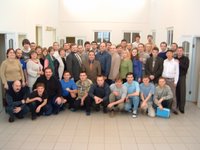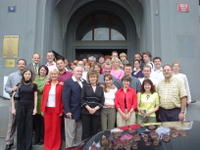
Before leaving for Moscow, Tom had to prepare the biennial reports for our headquarters in America regarding the educational ministries in Central and Eastern Europe. We were pleasantly surprised by the number of people being trained in our Bible schools and other training programs in our part of Europe. In 2004, we reported 501 students or ministers in training. In 2006, the number of students and ministers in training has risen to 819, an increase of 63 percent! Our educational ministries have grown to all of the fifteen countries in our field areas.
My boss, Dieter Knospe, present the following report to our missions board in February.
The following seven Bible schools are located in six countries on our field:
1. European Theological Seminary (ETS-Kniebis), Freudenstadt-Kniebis, Germany
- 52 full-time students
- 240 part-time students in extension courses in various European countries
- About 2,000 additional students enrolled in programs recognized through ETS-Kniebis, in conjunction with the education department of the Church of God in Africa
2. Eurasian Theological Seminary (ETS-Moscow), Moscow, Russia
- 40 full-time students
- approximately 102 students in four extension programs (Russia, Ukraine and Armenia)
3. Pentecostal Theological Institute, Bucharest, Romania
- 136 full-time students
- 19 part-time students
- several students in extension programs (MIP)
4. Bulgarian Theological College, Stara Zagora, Bulgaria
- 23 full-time students
- 20 MIP students
5. Latvian School of Christian Ministries, Jelgava, Latvia
- 147 total students
- 44 part-time students in the seminary
- 104 students in the extension program
6. Ukrainian Bible School, Slavyansk, Ukraine
- 30 full-time students (3-month intensive Bible school)
- 13 MIP students (extension program of ETS-Moscow)
7. Betania Bible Institute, Arad, Romania
- 56 full-time students
- 111 part-time students
Ministerial Internship Program
In each of these countries, the MIP program is operating parallel to the Bible institutes. The MIP course has 20 students in Austria, around 40 students in Armenia, and around 40 students in Belarus. The program also has been implemented in Hungary and Poland. In Prague, Czech Republic, we also have the discipleship training school, "The Mission," with many part-time students.
CIMS ProgressThe CIMS programs also are in the process of being translated into Russian, Hungarian, Polish, Ukrainian, Latvian, Bulgarian and German.
Eurasian Theological Seminary, Moscow
I particularly want to mention ETS Moscow. Located in the metropolis of the former Soviet Union with an impressive building, this school provides the Church of God with an extraordinary opportunity and challenge to build the kingdom of God and reach the Russian Empire and its many satellite countries with the gospel. It is completely possible to plant and sustain thousands of Church of God congregations in the region. ETS Moscow is predestined to take a key roll in this great task. Moscow is an ideal location: we could not have a better location. The facility of ETS is the fulfillment of a dream and offers excellent possibilities and space for 100 students.
As positive as these facts are, it would be a fallacy to think that a good building with a good location makes a good school - if it makes a school at all. What can really make ETS an excellent school is more competent faculty - dedicated and loyal to our denomination, teaching, training and motivating our students.
A second need at ETS-Moscow is that it has a slim operating budget, considering it is a school located in one of the most expensive cities of the world. With such a low budget, it is questionable if the school can continue to function. The costs of the new building are several times more than those of the smaller, more limited facility they used to occupy. Moscow is not only expensive in general, but the prices and the cost of living continue to rise with high inflation. In addition, the weakening of the US dollar has not helped.
 Over the Easter weekend, I traveled to Serbia where I was the main speaker for their national convention. Also in attendance were the pastors and members from Macedonia, Bosnia, and Croatia. (In earlier times, this would have been the national meeting of Yugoslavia. Even after the civil war and the disintegration of their former homeland, the ministers and members from these countries still convene yearly.) During the convention, the we had about 150 pastors and delegates.
Over the Easter weekend, I traveled to Serbia where I was the main speaker for their national convention. Also in attendance were the pastors and members from Macedonia, Bosnia, and Croatia. (In earlier times, this would have been the national meeting of Yugoslavia. Even after the civil war and the disintegration of their former homeland, the ministers and members from these countries still convene yearly.) During the convention, the we had about 150 pastors and delegates.





